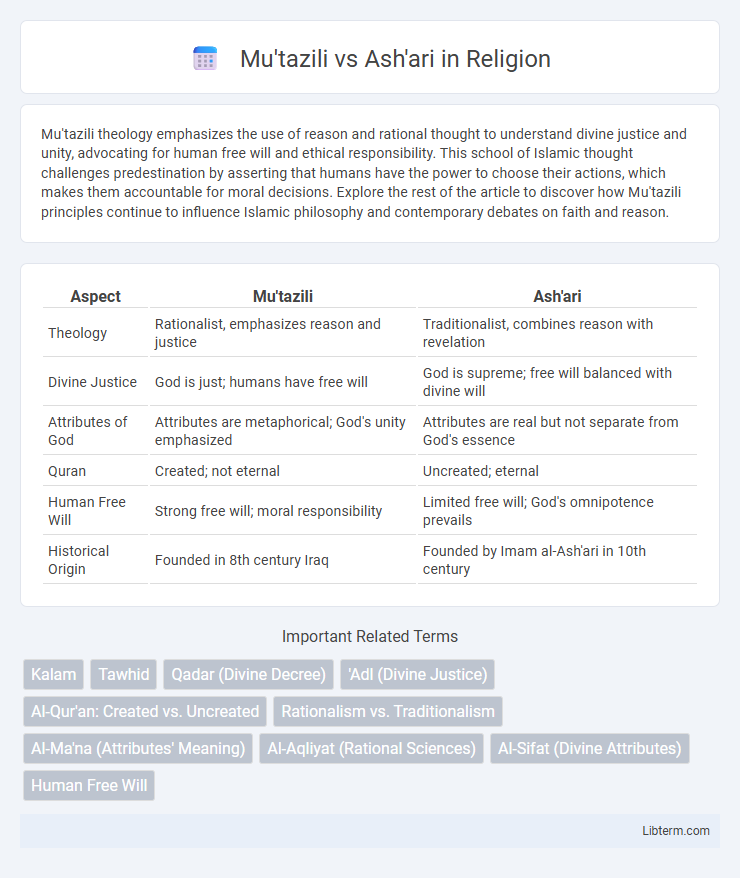Mu'tazili theology emphasizes the use of reason and rational thought to understand divine justice and unity, advocating for human free will and ethical responsibility. This school of Islamic thought challenges predestination by asserting that humans have the power to choose their actions, which makes them accountable for moral decisions. Explore the rest of the article to discover how Mu'tazili principles continue to influence Islamic philosophy and contemporary debates on faith and reason.
Table of Comparison
| Aspect | Mu'tazili | Ash'ari |
|---|---|---|
| Theology | Rationalist, emphasizes reason and justice | Traditionalist, combines reason with revelation |
| Divine Justice | God is just; humans have free will | God is supreme; free will balanced with divine will |
| Attributes of God | Attributes are metaphorical; God's unity emphasized | Attributes are real but not separate from God's essence |
| Quran | Created; not eternal | Uncreated; eternal |
| Human Free Will | Strong free will; moral responsibility | Limited free will; God's omnipotence prevails |
| Historical Origin | Founded in 8th century Iraq | Founded by Imam al-Ash'ari in 10th century |
Introduction to Mu'tazili and Ash'ari Schools
The Mu'tazili school, founded in the 8th century, emphasizes rationalism, asserting that human reason can independently discern ethical truths and that God's justice necessitates human free will. In contrast, the Ash'ari school, established by Abu al-Hasan al-Ash'ari in the 10th century, advocates theological traditionalism, asserting that divine revelation supersedes reason and that God's will is paramount, even if it appears beyond human logic. These schools represent foundational approaches in Islamic theology, influencing debates on reason, free will, and the nature of divine attributes.
Historical Origins and Development
The Mu'tazili school, emerging in the 8th century in Basra, emphasized rationalism and divine justice, advocating for human free will and the created nature of the Quran. The Ash'ari school, founded by Abu al-Hasan al-Ash'ari in the 10th century, arose as a response to Mu'tazili rationalism, promoting a middle path that reconciles reason with orthodox Sunni theology. Both schools significantly influenced Islamic theology, with Mu'tazilism declining politically but shaping later philosophy, while Ash'arism became the dominant theological framework in Sunni Islam.
Foundational Doctrines and Beliefs
Mu'tazili theology emphasizes divine justice and human free will, advocating rationalism and positing that God's attributes are not distinct from His essence. In contrast, Ash'ari doctrine upholds occasionalism, affirming God's absolute omnipotence and the use of revelation alongside reason, asserting that divine attributes are eternal and distinct yet inseparable from God's essence. Both schools diverge on the nature of the Quran, with Mu'tazilis viewing it as created, while Ash'aris maintain its uncreated, eternal status.
Divine Justice: Mu'tazili Rationalism vs. Ash'ari Occasionalism
Mu'tazili theology emphasizes Divine Justice through rationalism, asserting that human reason can discern moral truths and that God must act justly to uphold human accountability. In contrast, Ash'ari thought adopts Occasionalism, claiming that all events occur solely by God's direct intervention, negating independent causal power and emphasizing God's absolute will over human reason. This fundamental divergence affects interpretations of God's justice, with Mu'tazilis advocating for God's justice as inherently rational, while Ash'aris view it as beyond human comprehension, grounded in divine omnipotence.
Free Will vs. Predestination in Theology
Mu'tazili theology emphasizes free will, asserting that humans possess rational autonomy to choose their actions, thereby holding individuals accountable for their moral decisions. In contrast, Ash'ari theology advocates for predestination, claiming that God creates all actions, including human deeds, while humans acquire these actions without true control, maintaining divine omnipotence and justice. The debate reflects a fundamental divergence on reconciling divine omniscience and human responsibility within Islamic theological discourse.
The Nature of the Quran: Created or Uncreated?
The Mu'tazili school asserts that the Quran is created, emphasizing God's unity and rejecting any eternal, independent entity alongside Him to avoid compromising divine transcendence. In contrast, the Ash'ari doctrine maintains that the Quran is uncreated, viewing it as the eternal speech of God, coexisting with His essence and reflecting His divine attributes without division. This theological debate fundamentally shapes Islamic perspectives on divine revelation and God's attributes in classical Sunni thought.
Attributes of God: Literalism vs. Metaphorical Interpretation
Mu'tazili theologians emphasize a rationalist approach, advocating for a metaphorical interpretation of God's attributes to maintain divine unity and avoid anthropomorphism. In contrast, Ash'ari scholars uphold a form of literalism, accepting the scriptural descriptions of God's attributes without delving into their modality or anthropomorphic implications. This theological divergence shapes classical Islamic discourse on God's essence, balancing reason and revelation in interpretations of divine attributes.
Influence on Islamic Jurisprudence and Philosophy
Mu'tazili theology emphasized rationalism and justice, significantly influencing Islamic jurisprudence by advocating for human free will and ethical accountability, which shaped legal reasoning in early Islamic law. Ash'ari thought, prioritizing divine omnipotence and occasionalism, reaffirmed scriptural authority and shaped orthodox jurisprudence by emphasizing divine revelation over rational inference. Together, these schools contributed to the diversity of Islamic legal theory and philosophical debate, impacting Hanafi, Maliki, and Shafi'i legal traditions.
Major Figures and Their Contributions
Al-Jahiz, a prominent Mu'tazili figure, significantly advanced rational theology by emphasizing divine justice and human free will, shaping early Islamic intellectual thought. Al-Ash'ari, founder of the Ash'ari school, countered Mu'tazilite rationalism by advocating for divine omnipotence and occasionalism, reinforcing orthodox Sunni doctrine. Their opposing contributions laid the foundation for major theological debates in Islamic creed and jurisprudence.
Lasting Impact on Contemporary Islamic Thought
The Mu'tazili school, emphasizing rationalism and the primacy of reason in interpreting the Quran, significantly influenced theological debates on divine justice and human free will in contemporary Islamic thought. In contrast, the Ash'ari tradition upholds scriptural literalism and divine omnipotence, shaping mainstream Sunni theology and legal frameworks today. The ongoing discourse between these perspectives continues to impact modern Islamic scholarship, particularly in reconciling faith with rational inquiry and ethical governance.
Mu'tazili Infographic

 libterm.com
libterm.com